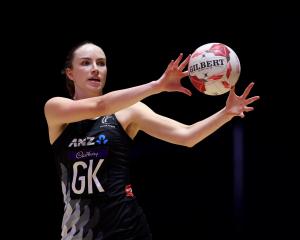
The man’s ideal sportswoman.
The belle of the court.
Joan Harnett-Kindley has been called it all.
But behind the media and public infatuation with the former Silver Fern’s looks was one of the craftiest netballers New Zealand produced.
Harnett-Kindley had an illustrious career playing for Canterbury for 14 years. She represented New Zealand, captaining in 45 games, from 1963 to 1971, including winning gold at the world championships in 1967 and silver in 1963 and 1971.
In 1999, she was named goal attack in the Silver Ferns’ "dream team", and was voted by the public as the dream player for Netball New Zealand’s 75th anniversary celebrations.
Yet it was still her beauty that captured people’s attention.
While that could have been a hindrance — and slightly offensive — Harnett-Kindley decided to use her limelight in netball’s favour.
"I think you have to laugh, really, because they just would not use those terms and words [today] that were used with me," Harnett-Kindley said.
"But, in saying that, I do think that God gave me those extra things and I do think that helped moved us up the ladder to get a bit more recognition.

During her playing era, recognition for netball was hard to come by.
It was deemed inappropriate for men to watch netball games live, players had to fundraise to get themselves to pinnacle events, and they struggled to get media coverage, including televised games.
Rugby, and other men’s sports, took priority.
"It was like women were the inferior sport, no matter what it was.
"We really weren’t recognised when we won the world title in 1967. Those were the issues that women in those days had to face.
"It was perhaps more a man’s world and now women have sort of made their mark over the last century, probably."
Giving men all the fame did not sit well with her, especially when women were winning world titles just as their male counterparts were.
Growing up, Harnett-Kindley’s mother always told her five daughters "women can do anything they want as long as they put their mind to it".
She championed women in every sense — netball and later in her real estate career — and alongside her team-mates, she worked to create a better future, and gain more coverage, for the sport.
"The reason why I did it was it was unfair. Totally unfair.
"Why should women not get the same recognition as men when they’re achieving the same sort of goals?
"It was always a goal of mine that we were going to be recognised at some stage and my peers’ as well.
"There was a group of us that always pushed for more publicity and more fairness.
"It was a challenge but it’s lovely to see or to know that you’ve been part of the change that we’ve got today — it’s fantastic what we’ve got now.
"A lot of people have worked hard to get us up into that position and we’re there now and we must make the most of it."
Having played during the amateur era, Harnett-Kindley was delighted netball had now turned professional.
But while it was great players were paid, there was still room for improvement, she said.
"We probably still need to be paid a bit more.
"It’s really not enough for most people to live on when you put in all of that time. They probably could do with a little bit more."
And as for the game itself?
It was faster and more physical than in her day and provided a great spectacle for the public getting behind it, she said.
"It’s a great game to watch and a better game to watch than it was in our day because the ball is moved a lot faster.
"I’m really thrilled to see where we’ve come and I hope we continue to keep ourselves up there as well because we need to stay up there.
"We need to stay right there with Australia."










